The Corsair MP700 Pro is the company’s latest PCIe Gen5 SSD to hit the market. Available in the usual M.2 2280 form factor, the MP700 Pro is powered by the Phison PS5026-E26 controller, which was released early 2022.
The drive employs 3D TLC NAND, a type of flash memory known for balancing performance, endurance, and cost, and is available in two capacities – 1TB and 2TB. Corsair’s new drive also comes with DRAM cache sizes of 2GB and 4GB, respectively, ensuring efficient handling of temporary data and swift access times.
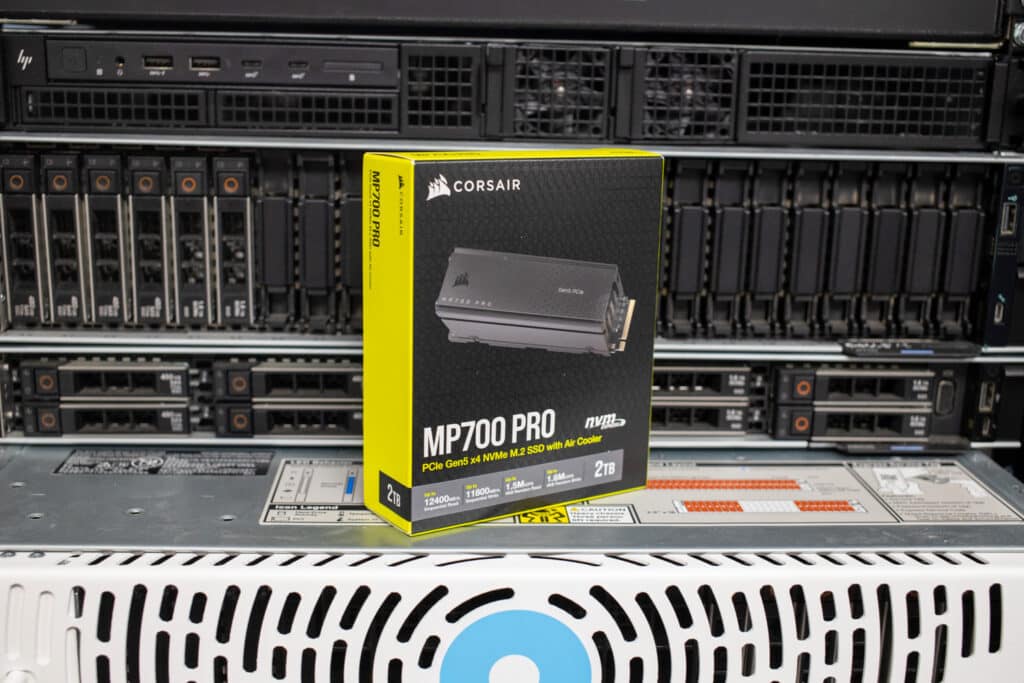
Corsair MP700 Pro Features
The Corsair MP700 Pro stands out with its three distinct versions, catering to different cooling needs. Besides the standard non-heatsink model, there are two advanced cooling options.
The first is an active cooling model, featuring a sleek black heatsink that effectively dissipates heat. The second variant is equipped with the Hydro X Series water cooler, designed for seamless integration into custom cooling loops. Corsair ensures that this water-cooled version is factory-built and tested, providing a reliable solution that can be easily integrated into your system to enhance cooling efficiency.
These slick-looking heatsinks are not only for aesthetics; depending on your use case, they can play a role in maintaining optimal operating temperatures to theoretically enhance the SSD’s performance and longevity. That said, most motherboards have inbuilt heatsink plates that are sufficient for cooling these SSDs.
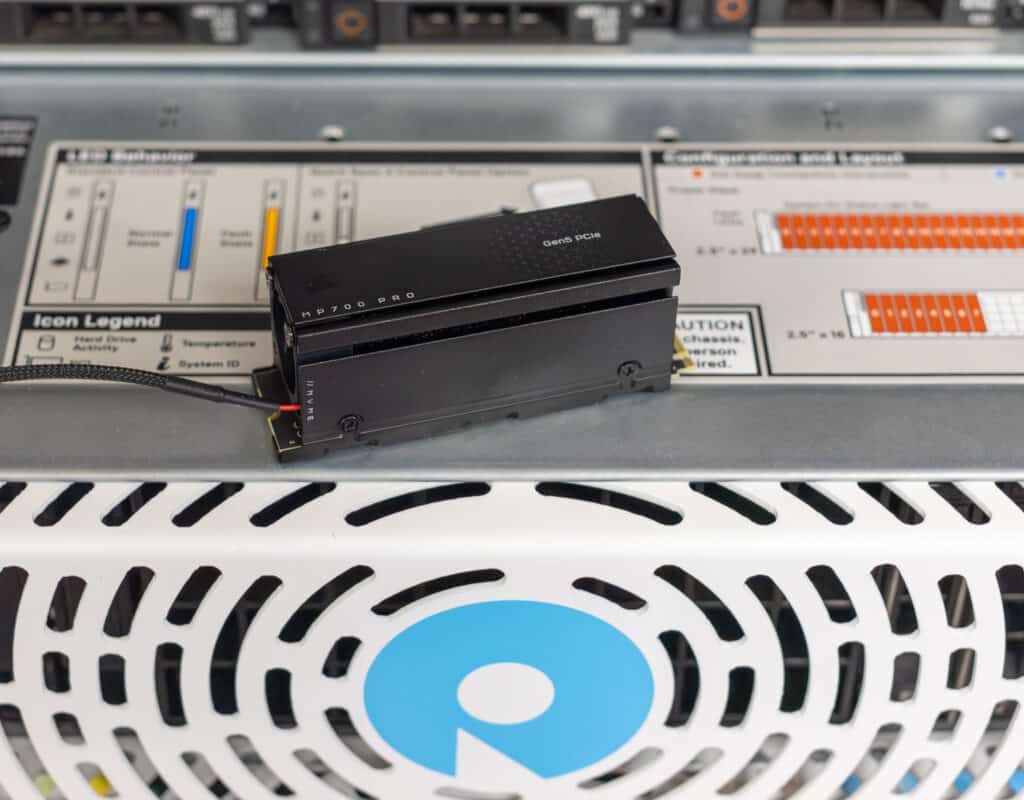
In terms of performance, Corsair quotes some solid numbers, especially in sequential read and write speeds. For the 2TB variant, it reaches up to 12,400MB/s read and 11,800MB/s write speeds, while the 1TB version slightly trails with up to 11,700MB/s read and 9,600MB/s write speeds.
The drive also exhibits high random read and write IOPS, peaking at 1,500K and 1,600K respectively for the 2TB model, which is indicative of its responsiveness and efficiency when handling multiple data requests.
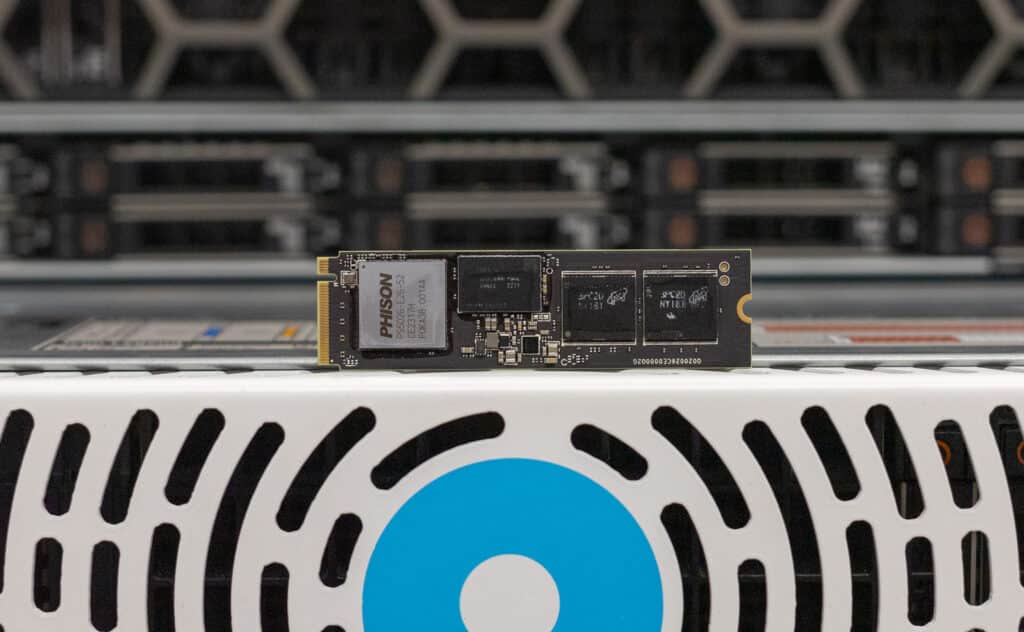
The MP700 Pro has an endurance rating of 1400TBW for the 2TB model, while the 1TB is quoted at 700TBW. The Mean Time Between Failures (MTBF) is stated as 1.6 million hours, which is usually what we see for consumer drives. Moreover, it offers AES 256-bit encryption for data security, a critical factor for users concerned about data protection.
Corsair MP700 Pro Pricing and Capacities
Backed by a 5-year warranty, the MP700 Pro goes for the following prices from Amazon (affiliate link):
- No heatsink: $180 (1TB)
- No heatsink: $300 (2TB)
- With Air Cooler heatsink: $190 (1TB)
- With Air Cooler heatsink: $325 (2TB)
- With Hydro X Series (water block): $325 (2TB only)
We are looking at the 2TB air cooler model for this review.
Corsair MP700 Pro Specifications
| Storage Form Factor | M.2 2280 |
| Controller | Phison PS5026-E26 |
| NAND | 3D TLC |
| DRAM Cache Size | 2096MB (1TB)
4096MB (2TB) |
| NAND Cache Size | Dynamic SLC |
| Encryption | AES 256-bit |
| Heatsink Color | BLACK |
| Heatsink | Active Cooler |
| Memory Type | PCIe Gen 5.0 x4 |
| Storage Temperature | -40°C to +85°C |
| Endurance | 1400TBW (2TB) 700TBW (1TB) |
| MTBF | 1.6 Million Hours |
| Max Sequential Read (CDM) Performance | Up to 12400MB/s (2TB)
Up to 11,700MB/s (1TB) |
| Max Sequential Write (CDM) Performance | Up to 11800MB/s (2TB)
Up to 9,600MB/s (1TB) |
| 4KB Random Read Performance | 1,500K IOPS (2TB)
1,400K IOPS (1TB) |
| 4KB Random Write Performance | 1,600K IOPS (2TB)
1,500K IOPS (1TB) |
| Storage Humidity | 93% RH (40° C) |
| Power Consumption Active | 11.5W Average |
| SSD Smart Support | Yes |
| SSD Operating Temperature | 0°C to +70°C |
| SSD Shock | 1500 G |
| Form Factor | M.2 2280 |
| Application Consumer | Client |
| SSD Compatibility | Form Factor: M.2 SSD|Supported
PCIe Gen5 Platforms: Select Gen5 capable boards from AMD 600 Series, Intel 600, 700 Backward compatible with PCIe Gen4 and Gen3 Platforms: Intel 100, 200, 300, 400, 500, X99, X299 Chipsets, AMD Socket AM4 Platform, X399, TRX40 |
| Features | TRIM, S.M.A.R.T, Garbage Collection |
| Voltage | 3.3V, +/- 5% |
| Vibration | 20Hz~80Hz/1.52mm, 80Hz~2000Hz/20G |
| DEVSLP | PS4: <85mW |
| Interface | PCIE* 5 x 4 |
| Weight | 0.034 |
Corsair MP700 Pro Performance
For this review, we will be looking at the 2TB model of the Corsair MP700 Pro. Comparables are a mixture of popular Gen4 SSDs and the Gen5 SSDs equipped with the Phison E26 platform:
For testing, we use two platforms. The consumer test platform supports PCIe Gen4/Gen5 SSDs and is sometimes leveraged for lighter consumer-based tests such as BlackMagic DiskSpeed Test and CrystalDiskMark, and our main platform, a Dell PowerEdge R760, which overlaps with our enterprise tests. For ultimate flexibility, we worked with Serial Cables, who supplied us with an 8-bay PCIe Gen5 JBOF for U.2/U.3, M.2, and E1.S/E3.S drive testing. This allows us to test all current and emerging drive types on the same test hardware.
Dell PowerEdge R760 Configuration
- Dual Intel Xeon Gold 6430 (32 cores/64 threads, 1.9GHz base)
- 1TB DDR5 RAM
- Ubuntu 22.04
VDBench Workload Analysis
When benchmarking storage devices, application testing is best, and synthetic testing is second. While not a perfect representation of actual workloads, synthetic tests help baseline storage devices with a repeatability factor that makes it easy to compare competing solutions. These workloads offer a range of testing profiles ranging from “four corners” tests and common database transfer size tests to trace captures from different VDI environments.
These tests leverage the common vdBench workload generator, with a scripting engine to automate and capture results over a large compute testing cluster. This allows us to repeat the same workloads across various storage devices, including flash arrays and individual storage devices. Our testing process for these benchmarks fills the entire drive surface with data, then partitions a drive section equal to one percent of the drive capacity to simulate how the drive might respond to application workloads. This differs from full entropy tests, which use 100 percent of the drive and take them to a steady state. As a result, these figures will reflect higher-sustained write speeds.
Profiles:
- 4K Random Read: 100% Read, 128 threads, 0-120% iorate
- 4K Random Write: 100% Write, 64 threads, 0-120% iorate
- 64K Sequential Read: 100% Read, 16 threads, 0-120% iorate
- 64K Sequential Write: 100% Write, 8 threads, 0-120% iorate
- VDI Profiles
Starting with 4K random read, the Corsair MP700 Pro Gen5 drive performed very well, hitting just over a million IOPS at 126ms. The Gen4 Solidigm P44 Pro SSD was the best-performing drive.
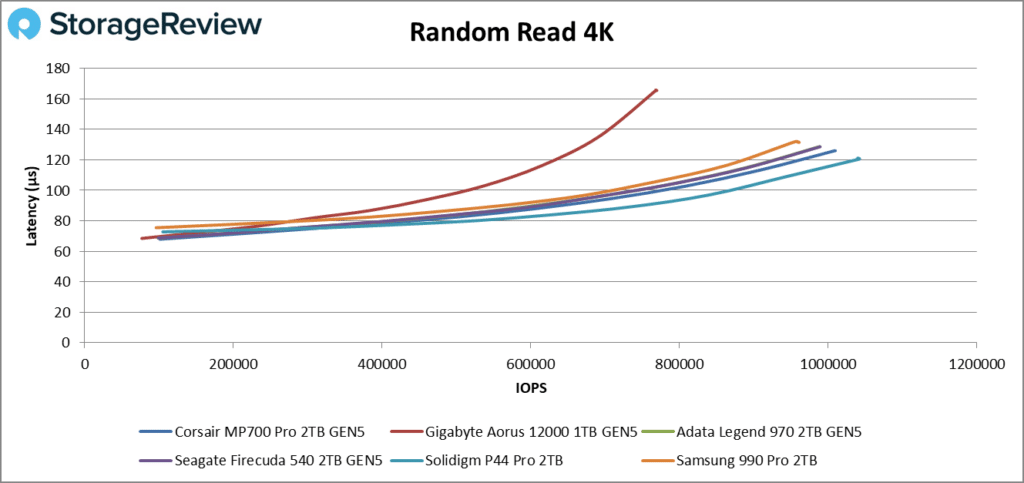
The Corsair MP700 Pro SSD faired well when it came to writes, peaking at 255K IOPS at just 80.8ms in latency. The best-performing drive here was by far the Samsung 990 Pro.
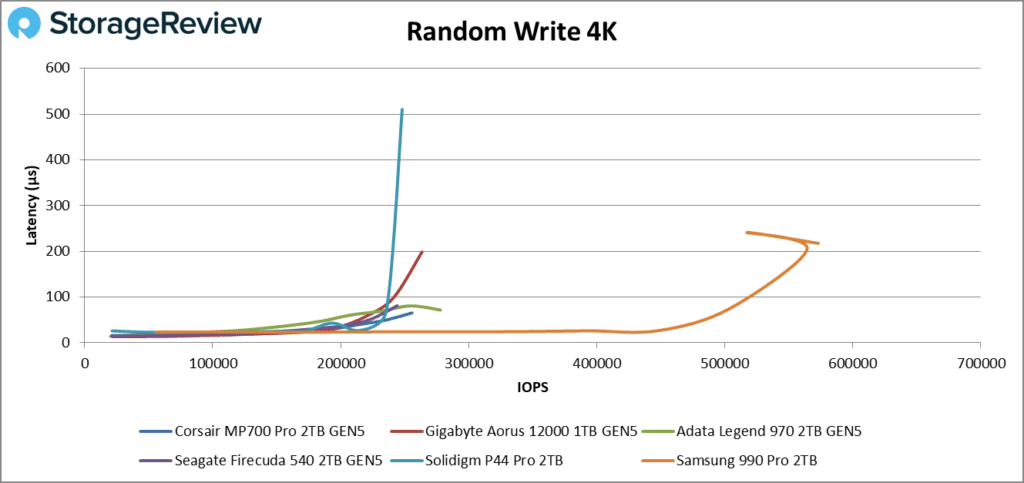
When switching to the sequential read 64k workload, the MP700 Pro performed much better, placing 1st overall among all tested drives. At its peak, it measured 8GB/s read (128K IOPS) with a latency of just a hair under 250ms.
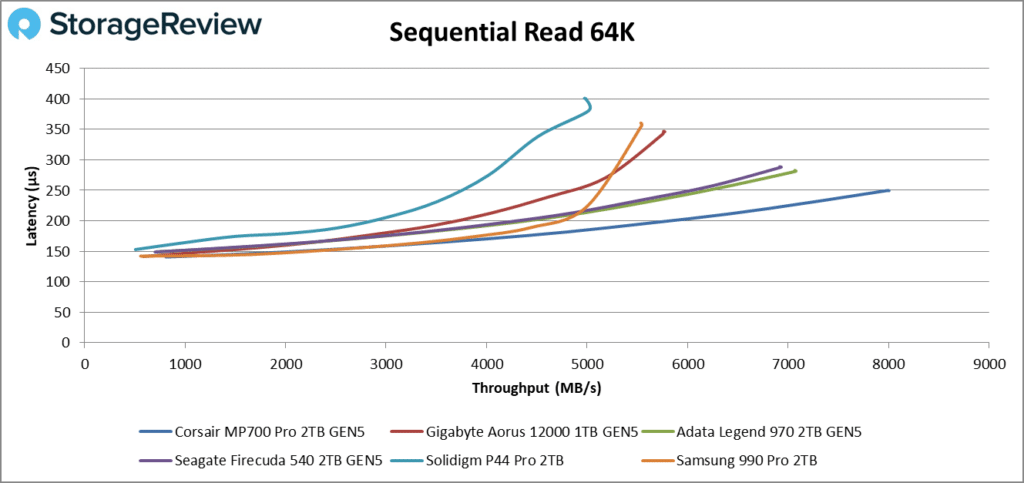
The Corsair MP700 Pro fell back a bit in sequential writes, peaking at 1.37GB/s at a latency of over 681.3µs before taking a slight spike in performance. This placed it 3rd.
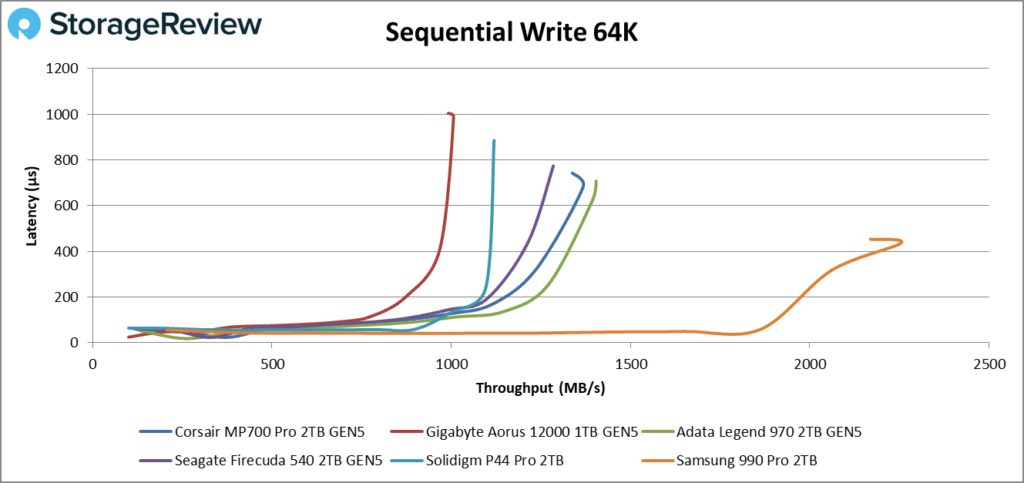
Next, we looked at our VDI benchmarks, designed to tax the drives further. These tests include Boot, Initial Login, and Monday Login. Starting with boot, the MP700 Pro had solid results, peaking at around 205K IOPS at 171.6ms for second among the test drives (just behind the Solidigm P44 Pro).
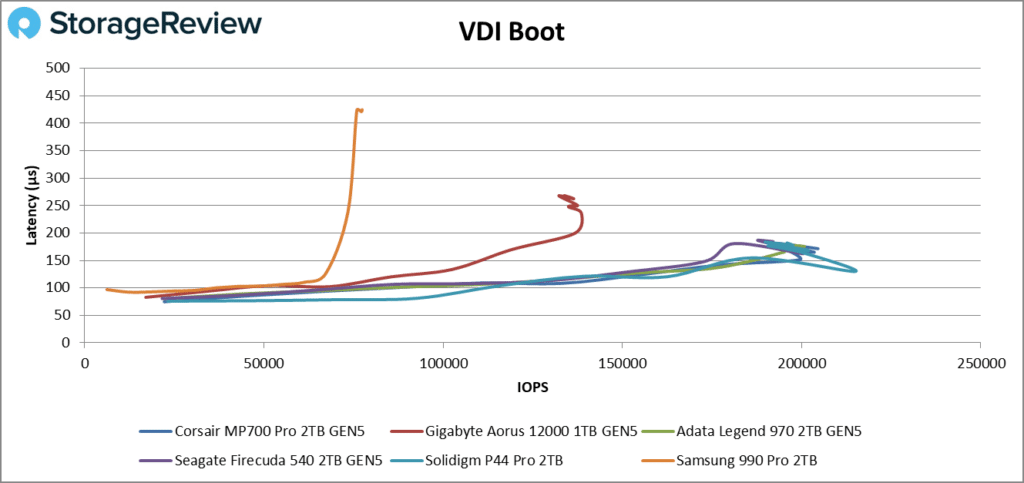
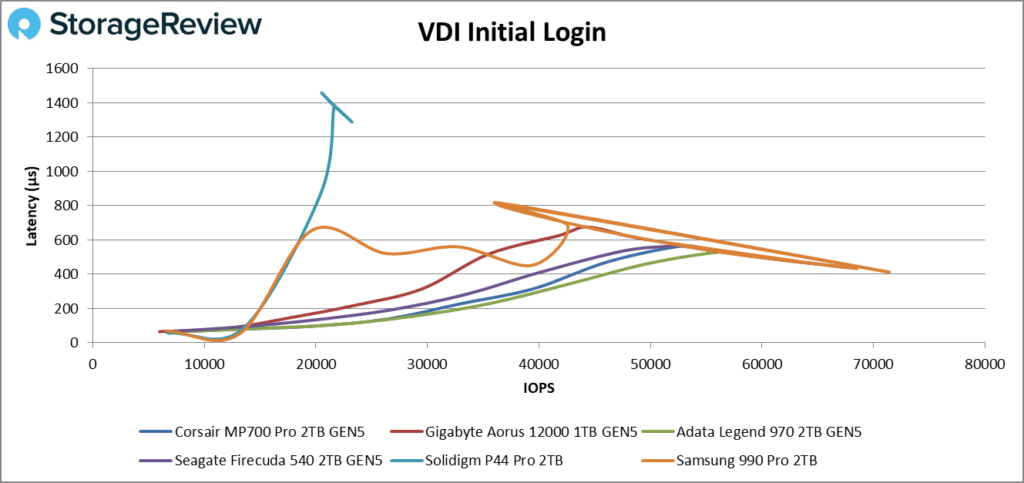
Lastly, we have the VDI Monday Login benchmark. Taking the top spot, the MP700 Pro peaked at 51K IOPS at a latency of 310.2ms.
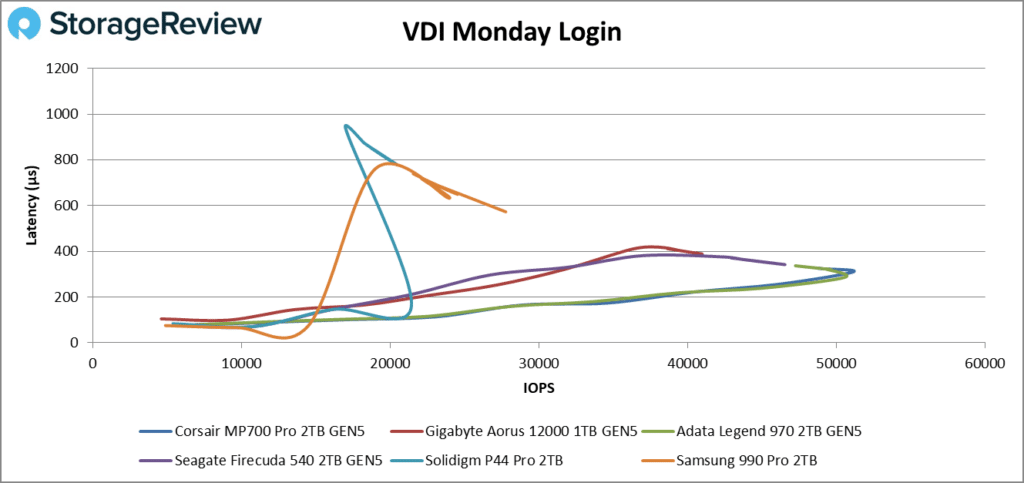
BootBench
BOOT-BENCH-1 is a workload profile adopted by OCP to profile SSDs designed for server boot duty. While this is intuitively a job for enterprise SSDs, client SSDs are often selected for their performance, capacity, and cost combination. The boot drive issue is germane not just to hyperscalers but also to server and storage system providers, as they face similar challenges.
This boot workload executes a relatively intense test plan that fills the entire drive with writes before testing a read-heavy workload sequence. For each test, it performs a 32K random read async operation alongside a 15MiB/s synchronous 128k random write and a 5MiB/s synchronous 128k random write/trim background workload. The script starts with the random-read activity at a 4-job level and scales up to 256-jobs at its peak. The final result is the read-operations performed during its peak run.
The OCP goal for this benchmark is a pass/fail at 60K read IOPS. Most drives we test will far exceed the minimum, but the results are instructive regardless.
Here, the Corsair MP700 Pro recorded 51,521.
Current boot leaderboard
| SSD | Read IOPS |
| Sk hynix Platinum P41 | 220,884 IOPS |
| WD SN850X | 219,883 IOPS |
| Solidigm P44 Pro | 211,999 IOPS |
| Fantom VENOM8 | 190,573 IOPS |
| Samsung 990 Pro | 176,677 IOPS |
| Sabrent Rocket 4 Plus | 162,230 IOPS |
| ADATA Legend 970 (Gen5) | 65,632 IOPS |
| Corsair MP700 Pro (Gen5) | 51,521 IOPS |
| Predator Storage GM7 | 35,302 IOPS |
CrystalDiskMark Speed Test
We performed a lighter-weight test on the Corsair MP700 Pro to demonstrate its Gen5 speeds. CrystalDiskMark’s higher queue depth (compared to BlackMagic) allows us to showcase the best-case scenario for the drive. That said, any real-world performance differences would likely be negligible.
Here, the drive recorded sequential transfer speeds exceeding 12.4GB/s read and 11.8GB/s write, which were the highest numbers we’ve seen for this test so far.
| CDM Speed Test | Corsair MP700 Pro | GIGABYTE Aorus 12000 | ADATA Legend 970 | GIGABYTE Aorus 10000 | Seagate Firecuda 540 |
| Write | 11.8GB/s | 9.5GB/s | 10.08GB/s | 10.08GB/s | 10.09GB/s |
| Read | 12.4GB/s | 11.7GB/s | 10.16GB/s | 10.18GB/s | 10.17GB/s |
BlackMagic DiskSpeed Test
Lastly, we measured performance inside a Windows 11 environment on our consumer test platform via the popular Blackmagic test. Here, new Corsair drive was able to hit 7.44GB/s read (higher than the average) and 9.64GB/s write (also higher than the average).
Here’s a quick run-down of how it compares to the other recent Gen5 drives:
| Disk Speed Test | Corsair MP700 Pro | GIGABYTE Aorus 12000 | ADATA Legend 970 | GIGABYTE Aorus 10000 | Seagate Firecuda 540 |
| Write | 9,645MB/s | 9,113.3MB/s | 9,634.7MB/s | 9,661.0MB/s | 9,575.6MB/s |
| Read | 7,439MB/s | 7,491.3MB/s | 6,755.6MB/s | 6,737.5MB/s | 6,746.5MB/s |
Conclusion
Ultimately, the Corsair MP700 Pro stands out in the market due to both its performance and cooling options. This SSD, available in 1TB and 2TB capacities, is powered by the Phison PS5026-E26 controller while utilizing 3D TLC NAND for a balance of performance, endurance, and cost. Its standout visual feature is an active cooling system encased in a sleek black heatsink, crucial for maintaining optimal operating temperatures.
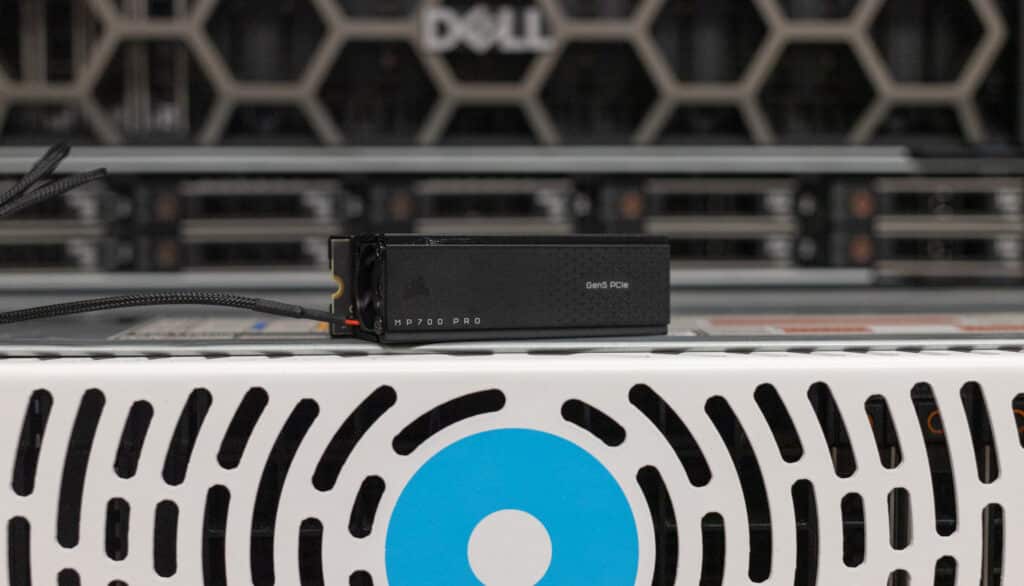
In terms of performance, The Corsair MP700 Pro SSD exhibited great overall performance in most benchmarks, making it a strong contender in the Gen5 drive category. In 4K random read tests, it achieved over a million IOPS, though it was outperformed by the Solidigm P44 Pro Gen4 drive (like all other SSDs in that test).
Its write performance peaked at 255K IOPS with low latency. The MP700 Pro stood out in sequential read 64k workloads, leading the pack with 8GB/s read speeds; however, it fell to third place in sequential writes. In VDI benchmarks, it consistently ranked high, showing particular strength in the Monday Login test.
CrystalDiskMark tests further showcased its capabilities with top-tier sequential transfer speeds exceeding 12GB/s, outperforming competitors. The BlackMagic DiskSpeed test within a Windows 11 environment revealed read and write speeds higher than the average, demonstrating the drive’s robust performance across different testing scenarios.
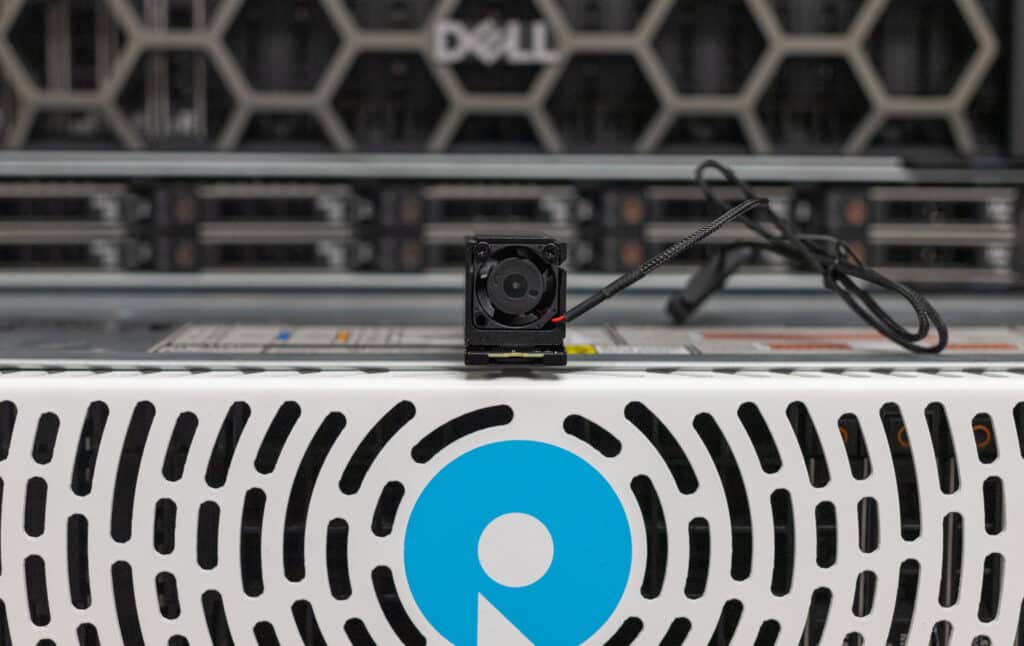
Comparing the Corsair MP700 Pro’s pricing with other Gen5 SSDs provides an interesting perspective. The MP700 Pro offers a range of options: the no-heatsink model is priced at $180 for 1TB and $300 for 2TB. Adding an air cooler heatsink increases the cost slightly to $190 for 1TB and $325 for 2TB. The Hydro X Series water block version, available only for 2TB, is also priced at $325.
In comparison to other consumer Gen5 SSDs, the GIGABYTE AORUS 12000 (heatsink included) is priced lower at $155 for 1TB and $265 for 2TB. The ADATA Legend 970 is a bit more expensive, at $218 for 1TB and $343 for 2TB, both with heatsinks. The Seagate FireCuda 540 aligns closely with the MP700 Pro’s no-heatsink pricing, at $180 for 1TB and slightly higher at $308 for the 2TB version, albeit without heatsinks. Overall, the MP700 Pro’s pricing is very competitive considering how well it performed during our benchmarking coupled with its ability to cater to a range of user preferences and system requirements.
In the rapidly evolving SSD market, the Corsair MP700 Pro positions itself as one of the better consumer PCIe Gen5 SSDs we’ve seen. Its combination of high-speed performance, enhanced cooling design, and robust feature set makes it a compelling choice for consumers and professionals alike who want the most out of their Gen5 SSD slot.




 Amazon
Amazon